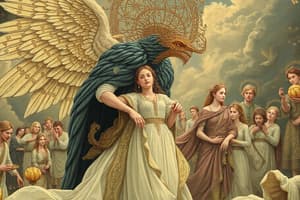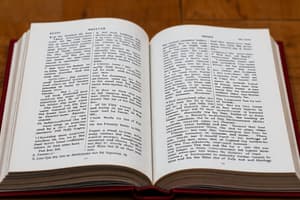Podcast
Questions and Answers
What is the primary focus of this examination of myth in literature?
What is the primary focus of this examination of myth in literature?
- A comparison of myth and history in literature
- The evolution of literary genres
- The psychological impact of myths on readers
- Myth as an element of fictional literature (correct)
Which literary forms are categorized under fictional literature according to the content?
Which literary forms are categorized under fictional literature according to the content?
- Historical writings and treatises
- Philosophical texts and autobiographies
- Plays, narrative poetry, and folk tales (correct)
- Essays, lyrics, and oratory
What distinguishes thematic literature from fictional literature in the provided context?
What distinguishes thematic literature from fictional literature in the provided context?
- The involvement of the author and reader as the only characters (correct)
- The use of moral or ethical teachings
- The incorporation of real-life events
- The presence of mythical characters
Why has myth been important in literary criticism according to the author?
Why has myth been important in literary criticism according to the author?
Which type of literature primarily focuses on internal characters?
Which type of literature primarily focuses on internal characters?
What aspect of myth is emphasized for discussion in this paper?
What aspect of myth is emphasized for discussion in this paper?
What does the author suggest about the relationship between poets and mythology?
What does the author suggest about the relationship between poets and mythology?
In what way does the discussion categorize literary works?
In what way does the discussion categorize literary works?
What central concept does the author suggest that continuity represents in the direct experience of fiction?
What central concept does the author suggest that continuity represents in the direct experience of fiction?
How does the text suggest our understanding of incidents in fiction changes upon critical study?
How does the text suggest our understanding of incidents in fiction changes upon critical study?
What is implied about the principle that characters exist for the sake of the action?
What is implied about the principle that characters exist for the sake of the action?
Which of the following best captures the subject of Arthur Miller's The Crucible according to the provided content?
Which of the following best captures the subject of Arthur Miller's The Crucible according to the provided content?
What does the text suggest happens to our memory of a narrative over time?
What does the text suggest happens to our memory of a narrative over time?
In the context of Hamlet, how does the author define the concept of theme?
In the context of Hamlet, how does the author define the concept of theme?
What does Robert Penn Warren suggest about the relationship between moral and aesthetic concerns in poetry?
What does Robert Penn Warren suggest about the relationship between moral and aesthetic concerns in poetry?
What does the author imply about traditional narratives and the action they depict?
What does the author imply about traditional narratives and the action they depict?
How does the author suggest the audience typically starts their analysis of a work of fiction?
How does the author suggest the audience typically starts their analysis of a work of fiction?
What is the term used for the 'thought' or reflective aspect suggested to a meditative reader?
What is the term used for the 'thought' or reflective aspect suggested to a meditative reader?
How does the third conception of 'theme' differ from the moving plot?
How does the third conception of 'theme' differ from the moving plot?
What role do smaller details of imagery play when viewing the theme as a unity?
What role do smaller details of imagery play when viewing the theme as a unity?
According to the content, what happens to memory of events as their focus shifts?
According to the content, what happens to memory of events as their focus shifts?
What does the concept of theme encompass when viewed as a manifestation of the plot?
What does the concept of theme encompass when viewed as a manifestation of the plot?
What does Robert Penn Warren imply about the vocabulary of contemporary criticism?
What does Robert Penn Warren imply about the vocabulary of contemporary criticism?
What is suggested about the changes of detail in relation to defining a different theme?
What is suggested about the changes of detail in relation to defining a different theme?
What is the primary function of recognition in tragedy, according to the content?
What is the primary function of recognition in tragedy, according to the content?
Which of the following does NOT represent an emblematic object in the context of recognition?
Which of the following does NOT represent an emblematic object in the context of recognition?
What does the term 'b?sanos' refer to in the context of the text?
What does the term 'b?sanos' refer to in the context of the text?
In tragic narratives, how does the resolution typically relate to the beginning of the story?
In tragic narratives, how does the resolution typically relate to the beginning of the story?
Which of the following best describes the term 'objective correlative' as used in the context?
Which of the following best describes the term 'objective correlative' as used in the context?
What role do 'birth tokens' play in Greek romance narratives?
What role do 'birth tokens' play in Greek romance narratives?
Which play is referenced as an example of various forms of recognition in a crucial scene?
Which play is referenced as an example of various forms of recognition in a crucial scene?
What is typically revealed through the process of recognition in a tragedy?
What is typically revealed through the process of recognition in a tragedy?
What experiment does the wise judge perform to determine the true mother of the child?
What experiment does the wise judge perform to determine the true mother of the child?
Which element is NOT mentioned as part of the structural importance in the narrative?
Which element is NOT mentioned as part of the structural importance in the narrative?
What is indicated as a misconception about imagination in the content?
What is indicated as a misconception about imagination in the content?
What is implied to be a limitation when imagination is left uninhibited in artistic creation?
What is implied to be a limitation when imagination is left uninhibited in artistic creation?
Which of the following is identified as a key figure in the context of imagination as a structural principle in creation?
Which of the following is identified as a key figure in the context of imagination as a structural principle in creation?
What is described as a frequent result of confusion around the concept of imagination?
What is described as a frequent result of confusion around the concept of imagination?
What does the description of the foolish judge imply about decision-making?
What does the description of the foolish judge imply about decision-making?
What does the term 'esemplastic' refer to in the context of creativity?
What does the term 'esemplastic' refer to in the context of creativity?
Flashcards are hidden until you start studying
Study Notes
Myth and Literature
- Myth has deep roots in many disciplines, including anthropology, psychology, and literary criticism.
- Poets have shown a consistent interest in mythology since ancient times, particularly from the era of Homer.
- Literature can be broadly categorized into fictional works (stories with characters) and thematic works (essays, lyrics, etc. involving only the author and reader).
Fictional vs Thematic Literature
- Fictional literature includes genres like novels, plays, and folk tales, which provide narratives centered on characters and plots.
- Thematic literature consists of works where the focus is on ideas or themes rather than on a narrative structure.
The Concept of Theme
- The concept of "theme" can be seen in various forms:
- As a subject, which can be summarized (e.g., the Salem witch trials in "The Crucible").
- As an allegorical representation that infers broader moral or philosophical meanings.
- As an integrated understanding of plot (mythos), emphasizing the unity and significance of the entire narrative rather than isolated events.
Narrative Complexity
- Readers often remember literature in a non-linear fashion, focusing on themes instead of a sequence of events.
- As readers revisit texts, their understanding tends to shift toward the thematic implications rather than the plot structure.
Recognition and Symbolism
- Recognition in narratives often coincides with a point of discovery or revelation, typically represented by symbolic objects (e.g., the needle in "Gammer Gurion's Needle").
- Emblems of identification (e.g., birthmarks, the scarlet letter) often play a crucial role in character recognition and plot resolution.
Structural Elements of Tragedy
- Tragedy usually follows a U-shaped structure with rising action leading to a crisis, followed by recognition and resolution, often revealing truths that were always present.
Role of Imagination in Literature
- The notion of imagination differs from mere association; true artistic creation requires a design or structural principle.
- While imagination can lead to unique artistic expressions, it is often constrained by the need for credible storytelling, challenging the idea of uninhibited creative freedom.
Critical Understanding
- In literary analysis, a critical understanding of myth, narrative, and theme is essential to grasp deeper meanings and implications in any given work of fiction.
Studying That Suits You
Use AI to generate personalized quizzes and flashcards to suit your learning preferences.




